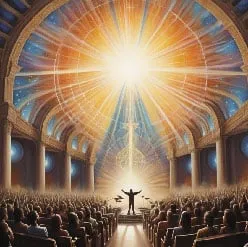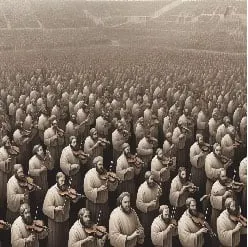Worshipping with Music: Unveiling The Divine Symphony
March 22, 2025 ; By N.Co
Introduction
Music is like a heavenly thread that runs through our spiritual lives, connecting us to the Divine. From the ancient songs of the Bible to modern worship music, it has always been a part of our journey toward experiencing God.
The Role of Music in the Bible
1. Psalms: The Songs of the Heart
The Book of Psalms is often referred to as the "songbook" of the Bible. These are not just any songs; they are prayers set to music, written by poets and prophets who wanted to capture the full range of human emotions and experiences. The Psalms express joy, sorrow, anger, and hope, making them relatable to people across time.
In Psalm 150:3-5, we read, “Praise Him with the sound of the trumpet; praise Him with the psaltery and harp. Praise Him with the timbrel and dance: praise Him with stringed instruments and organs.” These verses show us that music is not just an extra part of worship—it is an essential way to express our deepest feelings to God. Through music, we can communicate things that words alone cannot fully capture.

2. Exodus: A Song of Freedom
a. Song of the Sea. This song is sung by Moses and the Israelites after they safely crossed the Red Sea and witnessed the defeat of the Egyptian army. It is a powerful hymn of praise and thanksgiving to God for their deliverance. This is one of the earliest recorded songs in the Bible and is a powerful example of worship through music.
b. Miriams’ Song. After crossing the Red Sea, Miriam, the sister of Aaron, led the women in a joyful song of celebration. Their voices echoed across the waters, marking a moment of liberation and victory. “And Miriam the prophetess, the sister of Aaron, took a timbrel in her hand; and all the women went out after her with timbrels and with dances.” Exodus 15:20-21. Here, music became a way for the people to express their gratitude and joy. It was a public declaration of God’s faithfulness and power in their lives.
3. Temple Worship: Singing in the house of the Lord
In the times of the Old Testament, music was a big part of worship in the temple. The Levites, who were members of the tribe of Levi and assigned specific religious duties, were often the ones playing instruments like lyres, cymbals, and trumpets. Choirs of singers would lift their voices in praise, filling the temple with the sounds of worship.
According to 1 Chronicles 25:6-7, “All these were under the hands of their father for song in the house of the LORD, with cymbals, psalteries, and harps, for the service of the house of God.” Now let me spend a few moments talking about the worship team. King David, who himself was a skilled musician, organized the choir and musicians with great detail and structure:
There were 288 skilled musicians who were divided into 24 groups of 12 each. These groups served in rotation. In 1 Chronicles 23:3-5, it states that David organized the Levites and their duties when he was old. The Levites numbered 38,000 men who were 30 years old and above. Out of these: 4,000 or 10% were appointed to praise the Lord "with the instruments" David made for giving praise.
This suggests that there were about 4,000 musicians and singers from the tribe of Levi, a substantial group dedicated to the musical aspect of worship.
This large ensemble, which definitely requires a very organized structure, was under the direction of Asaph, Jeduthun, and Heman, who were responsible for leading and instructing the musicians.
It’s impressive to think about such a large and organized group dedicated to worship!
This meticulous organization highlights the importance of music in worship and the dedication to maintaining the highest standard of musical praise in the temple.

The music played in the temple was not just for the people—it was also a way to honor God and to create a connection between the earthly and the divine. The temple resounded with music that brought the worshippers closer to God’s presence.
The Transformative Power of Worship Music
1. Teaching and Reminding
Music has the power to teach us important truths about our faith. Hymns and spiritual songs often carry deep theological messages that help us understand who God is, what He has done for us, and how we should live our lives. When we sing these songs, we are not just enjoying the melody; we are also reinforcing the beliefs that shape our faith.
In Colossians 3:16, we are encouraged to, “Let the word of Christ dwell in you richly in all wisdom; teaching and admonishing one another in psalms and hymns and spiritual songs.” This verse reminds us that singing together is a way to share wisdom and to keep God’s word alive in our hearts. Through music, we learn and remember the core truths of our faith.
2. Emotional Connection
One of the most powerful aspects of music is its ability to connect with our emotions. Unlike words alone, music can reach deep into our hearts and stir feelings that are often hard to express. It can lift us out of sadness, fill us with joy, or give us peace in times of trouble.
The Psalms, for example, often reflect a wide range of emotions—from despair to praise. King David, who wrote many of the Psalms, did not hold back in expressing his feelings to God. Whether he was feeling abandoned, joyful, or in awe, he turned his emotions into songs. When we sing these Psalms, we are reminded that it is okay to bring all of our emotions before God. Through music, we can offer up our joys, sorrows, and everything in between to Him.
3. Unity and Community
Worship music also has the incredible ability to bring people together. When a congregation sings together, diverse voices come together to form one BIG sound. This act of singing in unity can create a deep sense of community and shared purpose among the worshippers.
Ephesians 5:19 encourages us to be, “Speaking to yourselves in psalms and hymns and spiritual songs, singing and making melody in your heart to the Lord.” When we sing together, we are not just joining our voices; we are also joining our hearts in a collective expression of worship. These moments of shared song allow us to experience a glimpse of eternity, as we unite in praise and thanksgiving.
The Roles of Musicians and Listeners in Worship
Musicians: More Than Performers
Musicians in worship are not just performers—they are anointed vessels through which the sacred can flow. Their music becomes a channel for the divine, helping to lead the congregation into a deeper experience of worship. Just as King David played the harp before the Lord, today’s worship musicians offer their skills as an act of devotion and service.
1 Chronicles 16:42 mentions, “And with them Heman and Jeduthun with trumpets and cymbals for those that should make a sound, and with musical instruments of God.” These musicians were set apart for the special task of leading worship through music. They were aware that their talents were gifts from God, to be used for His glory. When musicians play or sing in a worship setting, they help the congregation move beyond the ordinary and enter into a sacred space.
Musicians in the Front Lines of the Battle.
a. The Battle of Jericho (Joshua 6:1-20)
As the Israelites prepared to conquer the city of Jericho, God gave Joshua specific instructions to have priests and musicians lead the procession. Seven priests were to carry trumpets made of ram’s horns, blowing them while marching in front of the Ark of the Covenant. The people were to march around the city once a day for six days, and on the seventh day, they were to march around the city seven times. After the priests blew a long blast on the trumpets, the people shouted, and the walls of Jericho miraculously collapsed, allowing the Israelites to take the city.
b. Jehoshaphat's Battle (2 Chronicles 20:21-22)
King Jehoshaphat of Judah faced a massive coalition of enemy armies. After seeking God’s guidance, the king was told that the battle belonged to the Lord. Jehoshaphat appointed singers to go ahead of the army, singing and praising God. As they began to sing and praise, the Lord caused the enemy armies to turn on one another, leading to their defeat without Judah even needing to fight.
Listeners: Active Participants
While musicians play a crucial role in worship, the listeners also have an important part to play. Engaging in worship music, whether it is listening to a choir anthem, or participating in worship singing, is not a passive activity. As we sing, our hearts and minds are engaged in the act of worship. The music resonates within us, helping us to align our thoughts and feelings with the divine.
Psalm 95:1 invites us, “O come, let us sing unto the LORD: let us make a joyful noise to the rock of our salvation.” Listening to worship music is an act of participation. It is a way of joining in the song, even if we are not the ones singing or playing an instrument. As we participate, we can offer our own prayers and praises, making the music a personal experience of worship.
In conclusion, music has always been and continues to be an integral part of worship. Whether through the ancient Psalms, the songs of liberation in Exodus, or the temple worship led by the Levites, music serves as a powerful medium through which we connect with God. It teaches us, stirs our emotions, and unites us as a community of believers.
As we continue to worship with music, let us remember that every note played, every song sung, is an offering to the divine. Through this divine symphony, we draw closer to God, experiencing His presence in a way that is transformative. Whether we are singing, playing, or simply listening, let our hearts be open to the power of worship music—a gift that has the power to elevate our souls and bring us into communion with God.
